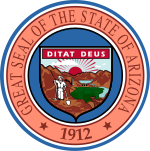
Kari Lake Halperin is an American political figure and former television news anchor. She was the Republican Party's nominee in both Arizona's 2022 gubernatorial and 2024 United States Senate elections.

Karen Fann is a former Republican member of the Arizona Senate, representing Arizona Legislative District 1. Fann became President of the Arizona Senate in 2019, and served until 2023.

Kelly Townsend is an American author, childbirth educator and birth doula who was a Republican politician. She was a member of the Arizona Senate representing District 16 from 2021 to 2023, and previously was a member of the Arizona House of Representatives from 2013 to 2021, acting as Majority Whip from 2017 to 2018.

Michelle Ugenti-Rita is an American politician and a former Republican member of the Arizona State Senate representing District 23 from 2019 to 2023. She previously served in the Arizona House of Representatives from 2013 to 2019. Ugenti served consecutively from January 10, 2011 until January 14, 2013 in the District 8 seat. She was a candidate for Secretary of State of Arizona in the 2022 election, but lost in the Republican primary.

The 2016 United States presidential election in North Carolina held on Tuesday, November 8, 2016, as part of the 2016 United States presidential election in which all 50 states plus the District of Columbia participated. North Carolina voters chose electors to represent them in the Electoral College via a popular vote, pitting the Republican Party's nominee, businessman Donald Trump, and running mate Indiana Governor Mike Pence against Democratic Party nominee, former Secretary of State Hillary Clinton, and her running mate Virginia Senator Tim Kaine. North Carolina had 15 electoral votes in the Electoral College.

The 2016 United States presidential election in Arizona was held on Tuesday, November 8, 2016, as part of the 2016 United States presidential election in which all 50 states plus the District of Columbia participated. Arizona voters chose electors to represent them in the Electoral College via a popular vote, pitting the Republican nominee, businessman Donald Trump, and running mate Indiana Governor Mike Pence against Democratic nominee, former Secretary of State Hillary Clinton, and her running mate Virginia Senator Tim Kaine. Arizona has 11 electoral votes in the Electoral College.

The 2016 Arizona Democratic presidential primary was held on March 22 in the U.S. state of Arizona as one of the Democratic Party's primaries ahead of the 2016 presidential election.
The 2016 Arizona primary took place on March 22, 2016, as part of the nominating process for the 2016 United States presidential election. Primaries were held at the same time for the Democratic Party, the Republican Party, and the Green Party. The Arizona primary was a closed primary, meaning that only voters registered with one of three parties were allowed to vote. Hillary Clinton was declared the winner on the Democratic side, Donald Trump won on the Republican side, and the Green party chose Jill Stein as their candidate. Arizona does not have presidential primaries. Arizona has presidential preference elections. Arizona state primaries are open, while Arizona preference elections are closed.

Venden "Vince" Leach is an American politician from Arizona. A Republican, he was a member of the Arizona State Senate from 2019 to 2023, representing District 11. From 2015 to 2019, he was a member of the Arizona House of Representatives representing District 11. Leach won the race for Arizona state senate from Legislative District 17 in the 2024 Arizona Senate election.
Helen Purcell served seven terms as the County Recorder for Maricopa County, Arizona. First elected in 1988, Purcell is a member of the Republican Party, and served until 2017.

The 2020 United States presidential election in Arizona was held on Tuesday, November 3, 2020, as part of the 2020 United States presidential election, in which all 50 states and the District of Columbia participated. Arizona voters chose 11 electors to represent them in the Electoral College via a popular vote pitting incumbent Republican President Donald Trump of Florida and his running mate, incumbent Vice President Mike Pence of Indiana, against Democratic challenger and former Vice President Joe Biden of Delaware and his running mate, United States Senator Kamala Harris of California. The Libertarian nominees were also on the ballot. This is the closest presidential election in Arizona history, surpassing the previous closest of 1964, in which Barry Goldwater won the state by just under a single percentage point.

The 2020 United States presidential election in Georgia was held on Tuesday, November 3, 2020, as part of the 2020 United States presidential election in which all 50 states plus the District of Columbia participated. Georgia voters chose electors to represent them in the Electoral College via a popular vote, pitting the Republican Party's nominee, incumbent President Donald Trump of Florida, and running mate Vice President Mike Pence of Indiana against Democratic Party nominee, former Vice President Joe Biden of Delaware, and his running mate Senator Kamala Harris of California. Georgia has 16 electoral votes in the Electoral College.

The 2020 United States presidential election in Texas was held on Tuesday, November 3, 2020, as part of the 2020 United States presidential election in which all 50 states plus the District of Columbia participated. Texas voters chose electors to represent them in the Electoral College via a popular vote, pitting the Republican Party's nominee, incumbent President Donald Trump, and running mate, Vice President Mike Pence, against the Democratic Party's nominee, former Vice President Joe Biden, and his running mate, California Senator Kamala Harris. The state of Texas had 38 electoral votes in the Electoral College.

The 2020 United States presidential election in North Carolina was held on Tuesday, November 3, 2020, as part of the 2020 United States presidential election in which all 50 states plus the District of Columbia participated. North Carolina voters chose electors to represent them in the Electoral College via a popular vote. The state was narrowly won by the Republican Party's nominee, incumbent President Donald Trump of Florida, and running mate Vice President Mike Pence of Indiana, against Democratic Party nominee, former Vice President Joe Biden of Delaware, and his running mate California Senator Kamala Harris. North Carolina had 15 electoral votes in the Electoral College.

The 2022 Arizona gubernatorial election occurred on November 8, 2022, to elect the next governor of Arizona, concurrently with other federal and state elections. Incumbent Republican Governor Doug Ducey was term-limited and ineligible to run for a third consecutive term. Democratic Arizona Secretary of State Katie Hobbs narrowly defeated Republican former television journalist Kari Lake.
In direct response to election changes related to the COVID-19 pandemic, 2020 United States presidential election in Arizona, and "Sharpiegate"; the Donald Trump 2020 presidential campaign launched numerous lawsuits contesting the election processes of Arizona. All of these were either dismissed or dropped.

The 2024 United States presidential election in Arizona took place on Tuesday, November 5, 2024, as part of the 2024 United States presidential election in which all 50 states plus the District of Columbia participated. Arizona voters chose electors to represent them in the Electoral College via a popular vote. The state of Arizona has 11 electoral votes in the Electoral College, following reapportionment due to the 2020 United States census in which the state neither gained nor lost a seat. Arizona was considered a crucial swing state in 2024.

The 2024 United States presidential election in Colorado took place on Tuesday, November 5, 2024, as part of the 2024 United States presidential election in which all 50 states plus the District of Columbia will participate. Colorado voters will choose electors to represent them in the Electoral College via a popular vote. The state of Colorado has 10 electoral votes in the Electoral College, following reapportionment due to the 2020 United States census in which the state gained a seat.

The 2021 Maricopa County presidential ballot audit, commonly referred to as the Arizona audit, was an examination of ballots cast in Maricopa County during the 2020 United States presidential election in Arizona initiated by Republicans in the Arizona State Senate and executed by private firms. Begun in April 2021, the audit stirred controversy due to extensive previous efforts by former president Donald Trump and his allies to overturn the election, and due to assertions of rule violations and irregularities in the conduct of the recount, leading to claims that the audit was essentially a disinformation campaign. In June 2021, Maggie Haberman of The New York Times and Charles Cooke of National Review reported that Trump had told associates that based on the results of the audit, he would be reinstated as president in August 2021.

Adrian Fontes is an American politician and attorney. A member of the Democratic Party, he has served as the Secretary of State of Arizona since 2023, after defeating Republican nominee Mark Finchem in 2022. Fontes previously served as the Maricopa County Recorder from 2017 to 2021.

























